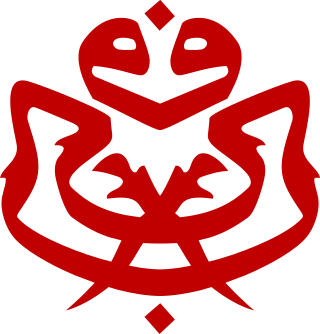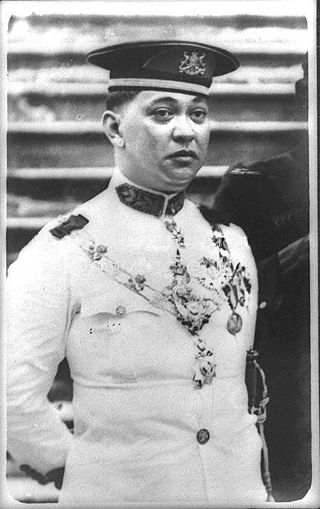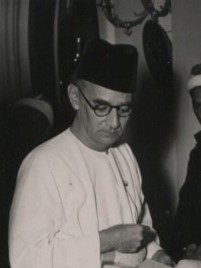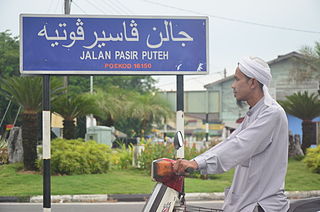Related Research Articles

Tunku Abdul Rahman Putra Al-Haj ibni Almarhum Sultan Abdul Hamid Halim Shah was a Malaysian statesman and lawyer who served as the 1st Prime Minister of Malaysia and the head of government of its predecessor states from 1955 to 1970. He was the first chief minister of the Federation of Malaya from 1955 to 1957. He supervised the independence process that culminated on 31 August 1957. As Malaya's first prime minister he dominated politics there for the next 13 years. In 1963, he successfully incorporated the Federation of Malaya, British North Borneo, Sarawak, and Singapore into the state of Malaysia. However, tensions between the Malay and Chinese communities resulted in Singapore's expulsion in 1965. His poor performance during race riots in Kuala Lumpur in 1969 led to his resignation in 1970. Commonly known simply as "Tunku", Tunku Abdul Rahman is widely regarded, even by his critics, as Malaysia's "founding father", the architect of Malayan independence and of the formation of Malaysia. As such, he is often referred to as Father of Independence or Father of Malaysia.

The United Malays National Organisation ; abbreviated UMNO or less commonly PEKEMBAR, is a nationalist right-wing political party in Malaysia. As the oldest continuous national political party within Malaysia, UMNO has once been called Malaysia's "Grand Old Party".

Sultan Ismail Al Khalidi Ibni Al-Marhum Sultan Sir Ibrahim Al-Masyhur was the 23rd Sultan of Johor and the 3rd Sultan of Modern Johor.

Tan Sri Tengku Razaleigh bin Tengku Mohd Hamzah is a Malaysian politician who served as the Member of Parliament (MP) for Gua Musang from August 1986 to November 2022 and for Ulu Kelantan from August 1974 to August 1986. He is the longest-serving MP by serving from 1974 to 2022 for 48 years. He is sometimes referred to as the Father of Malaysian Economic Development for playing a pivotal role in establishing and implementing key foundations and policies in Malaysian economy. A descendant of Malay royalty, he is a great-uncle of the current Sultan of Kelantan, Sultan Muhammad V.

Tun Musa bin Hitam is a Malaysian former politician who was Deputy Prime Minister of Malaysia from 1981 to 1986, serving under Mahathir Mohamad. He was the chairman of Sime Darby Berhad.
The Most Honourable Order of the Crown of Johor is an Order of chivalry awarded by the Sultan of Johor. It was first instituted on July 31, 1886.

PAP–UMNO relations refers to the occasionally-turbulent relationship between the People's Action Party (PAP), the governing party of Singapore since 1959, and the United Malays National Organisation (UMNO), the leading party of the Barisan Nasional coalition which governed Malaysia from 1955 to 2018. The two parties' relationship has impacted Malaysia–Singapore relations given the countries' geographical proximity and close historical ties.

Dato' Sir Onn bin Dato' Jaafar was a Malayan politician who served as the 7th Menteri Besar of Johor from 1947 to 1950, then Malaya. His organised opposition towards the creation of the Malayan Union led him to form the United Malays National Organisation (UMNO) in 1946; he was UMNO's founder and its first President until his resignation in 1951. He was famously known as the pioneer of organised anti-imperialism and early Malay nationalism within the entire Malaya, which eventually culminated with the Malayan independence from Britain. He was also responsible for the social and economic welfare of the Malays by setting up the Rural Industrial Development Authority (RIDA).
The phrase "Malaysian Malaysia" was originally used in the mid-1960s as the rallying motto of the Malaysian Solidarity Convention, a coalition of political parties led by Lee Kuan Yew of the People's Action Party (PAP) that served as an Opposition bloc to the Government of Malaysia, the Alliance Party.

The 1964 race riots in Singapore involved a series of communal race-based civil disturbances between the Malays and Chinese in Singapore following its merger with Malaysia in 1963, and were considered to be the "worst and most prolonged in Singapore's postwar history". The term is also used to refer specifically to two riots on 21 July 1964 and 2 September 1964, particularly the former, during which 23 people died and 454 others suffered severe injuries.
Article 153 of the Constitution of Malaysia grants the Yang di-Pertuan Agong responsibility for "safeguard[ing] the special position of the 'Malays' and natives of any of the States of Sabah and Sarawak and the legitimate interests of other communities" and goes on to specify ways to do this, such as establishing quotas for entry into the civil service, public scholarships and public education.
Ketuanan Melayu is a political concept that emphasises Malay preeminence in present-day Malaysia. The Malays of Malaysia have claimed a special position and special rights owing to their longer history in the area and the fact that the present Malaysian state itself evolved from a Malay polity. The oldest political institution in Malaysia is the system of Malay rulers of the nine Malay states. The British colonial authorities transformed the system and turned it first into a system of indirect rule, then in 1948, using this culturally based institution, they incorporated the Malay monarchy into the blueprints for the independent Federation of Malaya.
The social contract in Malaysia is an artificial political construct first mooted in the 1980s, allegedly to justify the continuation of preferential policies for the majority Bumiputera population beyond the envisaged 20-year initial duration of the Malaysian New Economic Policy. Proponents of the construct allege that it reflects an understanding arrived at - prior to Malaya's independence in 1957 - by the country's "founding fathers"

Tun Dr. Ismail bin Abdul Rahman was a Malaysian politician who served as the second Deputy Prime Minister of Malaysia from September 1970 to his death in August 1973. A member of the United Malays National Organisation (UMNO), he previously held several ministerial posts.
"Pendatang asing", "orang pendatang" or "pendatang" is a common Malay phrase used to refer to foreigners or immigrants; "pendatang asing" literally means "foreign comer" or "foreign immigrant". Although most frequently used to refer to foreign immigrants, especially illegal immigrants, pendatang asing has been used by some politicians in Malaysia as pejorative way of addressing non-Bumiputera Malaysians.

Syed Jaafar Albar was a Malaysian politician. His staunch defence of his political party, the United Malays National Organisation (UMNO) – which leads the governing Barisan Nasional coalition – led to him being given the moniker "Lion of UMNO". He was also known for his radical views on Malay sovereignty over Malaysia, and Malay supremacy in politics, and is of Hadhrami Arab descent. He was born in Celebes, Dutch East Indies and migrated when he was 14 years old to Singapore.

This article lists important figures and events in Malaysian public affairs during the year 1967, together with births and deaths of notable Malaysians.

Singapore, officially the State of Singapore, was one of the 14 states of Malaysia from 1963 to 1965. Malaysia was formed on 16 September 1963 by the merger of the Federation of Malaya with the former British colonies of North Borneo, Sarawak and Singapore. This marked the end of the 144-year British rule in Singapore which began with the founding of modern Singapore by Sir Stamford Raffles in 1819. At the time of merger, it was the smallest state in the country by land area, but the largest by population.

The Most Esteemed Order of the Defender of the Realm is a Malaysian federal award presented for meritorious service to the country. The Order Motto are 'Dipeliharakan Allah-Pangkuan Negara'.
References
- ↑ Sopiee 1976 , p. 194
- ↑ Customer Service, University Tunku Abdul Rahman Library (2005). "Universiti – Perlukah sebuah lagi?" Archived 13 February 2006 at the Wayback Machine . Retrieved 14 February 2006.
- ↑ Goh, Jenny (23 July 1997). Small spark can create big mess Archived 25 March 2006 at the Wayback Machine . Straits Times .
- ↑ Lee, Hock Guan (2001). "Political Parties and the Politics of Citizenship and Ethnicity in Peninsular Malay(si)a, 1957–1968" Archived 18 January 2006 at the Wayback Machine . Retrieved 22 February 2006.
- ↑ Alatas, Syed Farid (2002). "ISLAM, DEMOCRATIZATION AND CIVIL SOCIETY IN INDONESIA AND MALAYSIA" [ permanent dead link ]. Retrieved 22 February 2006.
- 1 2 Means 1991 , p. 22
- ↑ Means 1991 , p. 10
- ↑ Sopiee 1976 , p. 201
- ↑ Sopiee 1976 , p. 204
- ↑ Sopiee 1976 , p. 203
- ↑ Means 1991 , pp. 14–15
Works cited
- Sopiee, Mohamed Noordin (1976). From Malayan Union to Singapore Separation: Political Unification in the Malaysia Region 1945-1965. Penerbit Universiti Malaya.
- Means, Gordon P. (1991). Malaysian politics : the second generation. Singapore: Oxford University Press. ISBN 0-19-588983-5. OCLC 22278996.